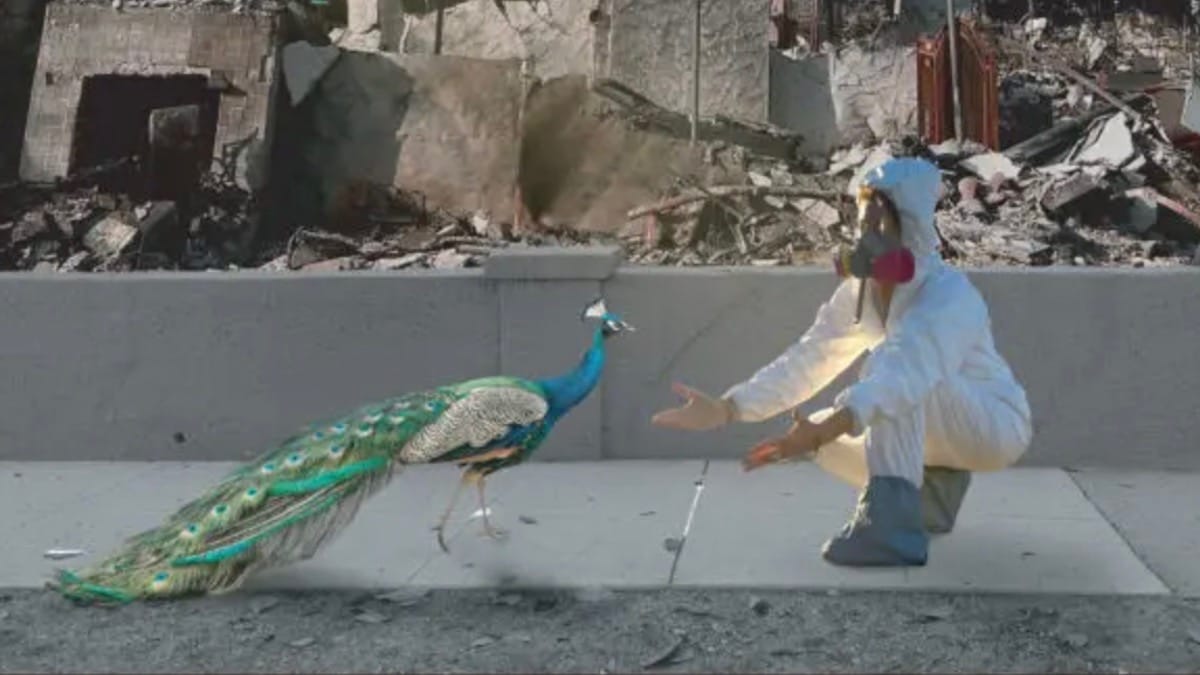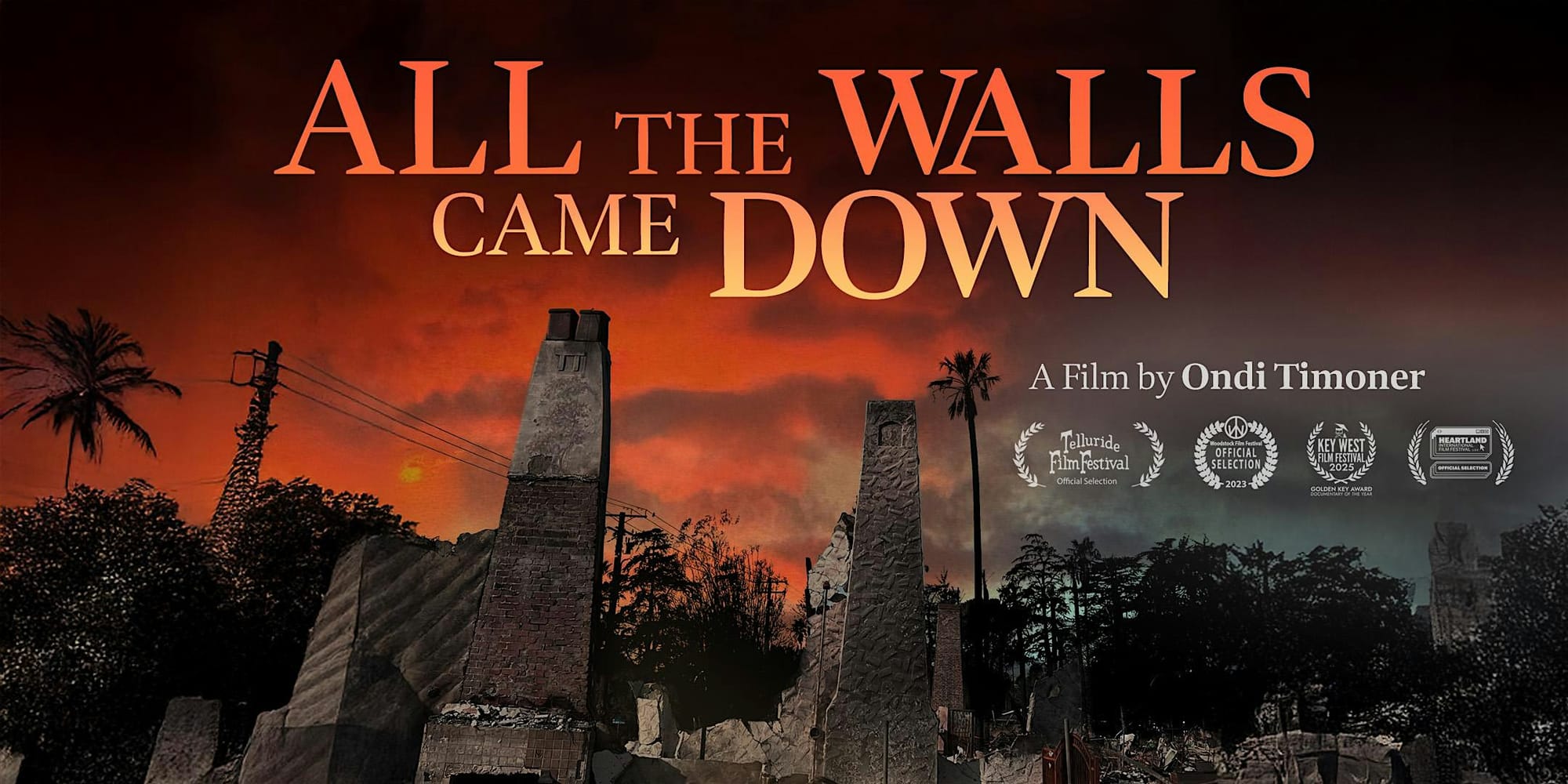Ondi Timoner's All the Walls Came Down: An Ode to a Magical Place Devastated by LA Wildfires
The director talks about the healing journey of her latest film.

This post is free but it’s worth it to become a paid member of The Film Maven community! Paid subscribers are the backbone of The Film Maven who support independent journalism, as well as female- and disabled-created content. Paid Film Mavens get access to two-three exclusive articles a week including access to my series The Trade and Popcorn Disabilities, as well as the ability to chat with me on The Film Maven's Discord server.
Don't want to commit to a subscription? Leave a tip to show you enjoy what you're reading.
Enjoy what you’re reading? Share it with friends. Help us get to 1,000 subscribers by the end of 2025 and I’ll do a full written and video review of Francis Ford Coppola’s Megalopolis.
Read more about the history of disability in film by pre-ordering my upcoming book, Popcorn Disabilities: The Highs and Lows of Disabled Representation in the Movies. I not only expand on what you’re reading here, but examine the stereotypes, tropes, and the good, bad (and really ugly) of disabled movies. Preorder the book by clicking this link! Send me proof of your preorder and I’ll give you a paid subscription to The Film Maven for one year!
One of the most striking images from All the Walls Came Down is that of filmmaker Ondi Timoner in a hazmat suit, communing with a local peacock who survived the devastating Altadena fires in January. It's a symbol of grief and loss, but also of hope.
Like thousands of other residents of the Los Angeles suburb, the Dig! and Mapplethorpe director lost her home and everything she owned. In the wake of the tragedy, which left the close-knit San Gabriel Valley town in ashes, Timoner did what she does best. She kept filming. And she wasn't alone. Relatives, friends and neighbors flocked to help, often operating the camera as she and her wife Morgan dug through the rubble of what used to be their house.
In the short film, which has been playing at numerous festivals, she documents not only her own loss but the losses of her brother, neighbors and wider community. "I wasn't going to make a movie that was just about my house burning down," she said in a Zoom interview on Thursday.
A large part of the film is dedicated to Altadena residents who lost homes that had been in their family for generations. On top of that the city is one where 80 percent of the Black population owned their own houses.
Timoner shared that when she first screened the film for a friend, they told her she was trying to combine two separate stories: Her own and that of the Black activist Heavenly Hughes, who is leading the "Altadena is not for sale," movement as residents face homelessness or foreclosures.
She chose to ignore her friend's advice to split the two narratives. "They're very much interconnected. They were saying it just felt like two worlds apart, but it's not. It's one world and it's called Altadena. It's hard to balance that kind of intimate, personal storytelling with an activist story and a community story," she noted.
"I think the structure of it is almost like dropping a pebble in the pond. It goes out in circles from my story, in concentric circles. It's my neighbor across the street, and then my brother, and then my neighbors, and then we find Heavenly," she said from a taxi ride home from LAX. She'd just landed from filming her upcoming Holocaust feature in Budapest. Timoner was in the Eastern European city working on that film in January when she got a text from her neighbor Randy Vance that her house was gone.
She describes her documentary, which includes footage of Altadena before and after, as a "quilt" of the city and "an ode to a magical place."

"I used to hate the cloud," she laughed while discussing how she was able to incorporate before footage of her home, joyous community events and beloved Altadena spots like Fox's Restaurant. "Now I love the cloud." Thanks to digital storage, she could revisit what she'd lost, including the peacocks. "I was always shooting them," she said of footage that includes a peachick following its mother along with family celebrations by her pool.
She finished All the Walls Come Down in record time, wrapping up filming in July and holding the first viewings just days later. Timoner cited two reasons why the film is closer to thirty minutes than ninety: She reasoned that no one wanted to relive the fires right now, and she is using the film as a rallying cry for the community and a tool to help save Altadeneans recover and rebuild.
In one scene, Timoner shows Hughes and singer Aloe Blacc vainly trying to get an indifferent Supervisor Kathryn Barger, the politician representing the city, to respond at a public event. Instead of engaging, Barger walks away saying, "This is not the time."
The filmmaker is also campaigning for Governor Gavin Newsom to halt foreclosures as residents wait for insurance payouts that may never come.
"Not being able to go home was too painful, and I thought we should try to start anew somewhere close enough that we could take care of our parents, but far enough that it was a new adventure,' she explained. "So we made a spontaneous decision to move to Joshua Tree, and the community has been so incredibly welcoming and is so lovely and strong and artistic and inspiring and inspired," she said, noting that Morgan, a musician, is now playing in a few local bands. "We feel really embraced," she said.
Despite loving her new home in Joshua Tree, Timoner said she fully intends to rebuild in Altadena, adding, "I don't want to leave a gaping hole in the place where we had so much happiness."
You can read more about the grassroots effort at the film's official site.
All the Walls Came Down, as well as two other Timoner films, Dig! and Last Flight Home, screen Nov. 1 and 2 at the Joshua Tree Cultural Center, the desert spot where Timoner and Morgan have temporarily located.
Sharon Knolle is an award-winning entertainment journalist who has written for TheWrap, USA Today, Paste, Moviefone and LAist. She previously interviewed Timoner in January at the LA screening of Dig! XX, which revisits her documentary Dig! 20 years later.
Come to the Los Feliz 3 on November 16th where I'll be launching my book Popcorn Disabilities with a book signing and a screening of Tod Browning's Freaks. Tickets on sale now.
The Film Maven is seeking sponsors to help us do more! If you're interested in sponsoring independent journalism get in touch.
Let’s work together! If you have editorial opportunities and would like to collaborate with me on an entertainment or disability project, drop me a message.




